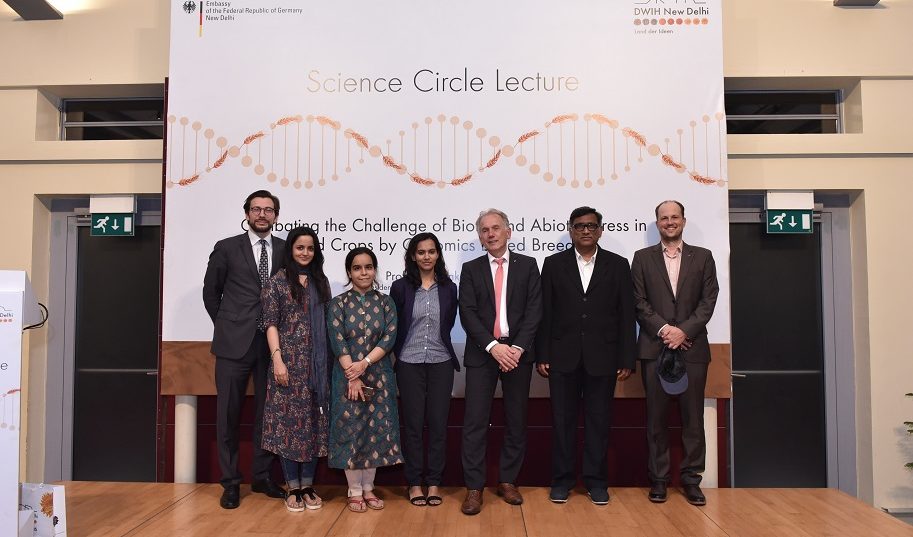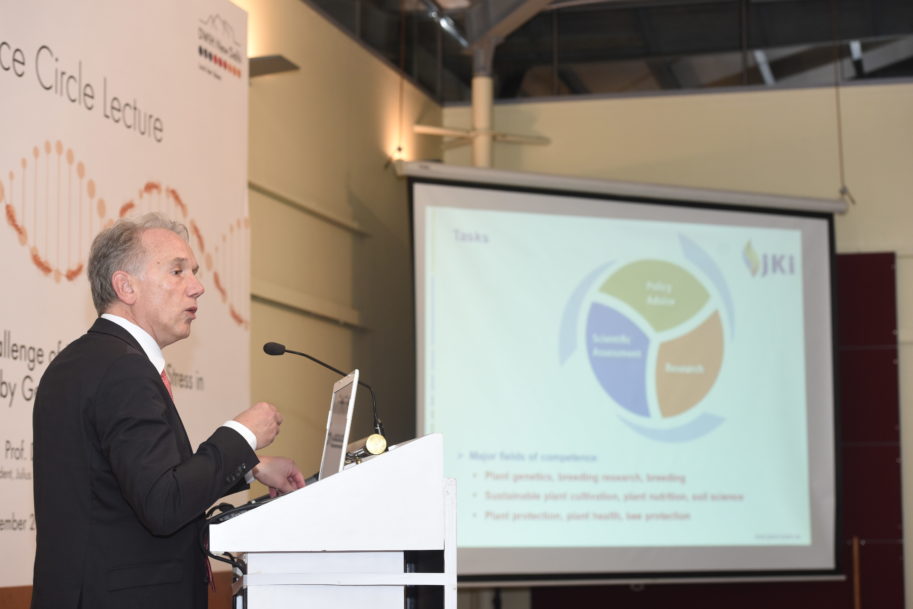Science Circle Lecture: Combating the challenge of biotic and abiotic stress in food crops by genomics based breeding
 © DWIH New Delhi
© DWIH New Delhi
DWIH New Delhi along with the Embassy of the Federal Republic of Germany in New Delhi, organised a Science Circle Lecture with Prof. Dr. Frank Ordon, President of the Julius Kühn-Institute (JKI), Quedlinburg, Germany.
Venue: Embassy of the Federal Republic of Germany, Shantipath, Chanakyapuri, New Delhi, 110021
We are facing many challenges against the background of climate change and in general agriculture has to become more sustainable. This means for the future, that we have to produce food and feed by less water and by applying less fertilizers and plant protection products, but simultaneously have to increase or at least maintain yields. To achieve this, we need crops, which are more resource efficient with respect to water and fertilizers and are more resistant to pests and diseases as well as to abiotic stress. In this respect, breeding is most important. At the end, plants can only develop those traits in the field - interacting with the environment and the respective management - which are genetically fixed in seeds. So seeds are at the very beginning of the production chain and therefore plant breeding is of prime importance for adapting agriculture to future climate scenarios and to improve sustainability. In this respect one should keep in mind that research to implement machine learning in the selection processes during plant breeding has just started. We now have very big genotypic and phenotypic data sets available. So the implementation of AI in plant breeding may be a next step.Prof. Dr. Frank Ordon, President, Julius Kühn-Institute (JKI) Germany
Link to the interview with Prof. Dr. Frank Ordon
Read the complete interview with Prof. Dr. Frank Ordon here.
Event Information
November 14, 2019, 5:00 PM to 7:30 PM
New Delhi
Organizer(s): DWIH New Delhi, German Embassy New Delhi
Abstract
In 2050 about ten billion people have to be fed in the background of climate change. In this respect wheat and barley are of special importance. However, both are hit by many pathogens causing severe yield losses and both suffer from increasing drought, worldwide. Therefore, in order to ensure a sufficient cereal production, improving resistance to biotic and abiotic stress by breeding is of prime importance. In this respect, genetic resources are a valuable treasure trove to cope with these challenges. For using the genetic diversity present in gene banks, it is of prime importance (i) to screen genetic resources for traits of interest, (ii) develop molecular markers for these traits and (iii) use these for an enhanced introgression into adapted cultivars. Today molecular tools are available facilitating an efficient use of these genetic resources in breeding. While in the past marker development was time consuming and laborious, today genomic resources like the Infinium iSelect genotyping bead chips, genotyping by sequencing (GBS) and the availability of reference sequences in barley and wheat facilitate efficient marker development for major genes and quantitative trait loci (QTL) and pave the way for enhanced gene isolation. The isolation of genes involved in these traits will transfer breeding to the allele level and will facilitate the sequenced based identification of novel alleles in large gene bank collections and their directed use in plant breeding as well as site directed mutagenesis. Examples of using these genomic tools to improve resistance to fungal and viral pathogens as well as to insects and for improving drought stress tolerance in wheat and barley are given.
Speaker
Prof. Dr. Frank Ordon
President, Julius Kühn-Institute (JKI)
Quedlinburg, Germany

Prof. Dr. Frank Ordon is president of the JKI and honorary professor for “Molecular resistance breeding” at the Martin-Luther-University, Halle-Wittenberg, Germany. He studied agricultural science at the Justus Liebig University in Giessen, Germany, where he also got his PhD and state doctorate (Dr. habil.).
He has a background in molecular plant breeding with a focus on estimation and exploitation of genetic diversity in several crop species. His primary contributions include development of molecular markers for resistance genes to fungal and viral pathogens up to gene isolation. In addition, he has been working on the identification of QTL (Quantitative Trait Locus) and genes for resistance/tolerance to abiotic stress, e.g. drought, frost.
He has been serving as Chair of the scientific board of the German Society for Plant Innovation (GFPi) since 2016 and of the Research Committee of the International Wheat Initiative since 2014. He is the editor in chief of “Plant Breeding” and is a member of several editorial boards including “Theoretical and Applied Genetics” and the “Journal of Plant Diseases and Protection,” among others. He also has more than 140 peer reviewed papers to his credit.

